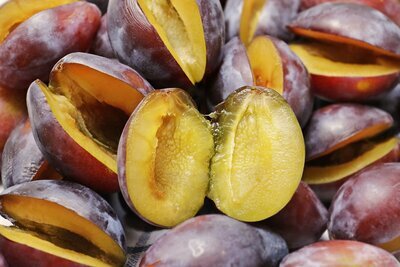Are plums healthy?
Who can resist a juicy plum? When the summer is over, many people increasingly reach for the delicious stone fruit. But how healthy are plums actually? We'll tell you.

The ingredients of plums
What does a plum have to offer? The following overview shows the most important macro and micronutrients per 100 g plum (source DGE):
- Energy: 48 kcal/ 200 kJ
- Egg White: 1g
- Fat: 0.1g
- Carbohydrates: 10 g, of which sugars: 9 g
- Fiber: 1.6 g
- Carotenoids: 365 μg
- Potassium: 160 mg
- Calcium: 20 mg
Problems with bowel movements can be very distressing. Before you resort to laxatives to...
A natural plum consists of 83% Water. It has a high sugar content and is therefore a good source of energy. A plum contains numerous minerals and vitamins in minimal amounts. The carotenoids lutein, beta-carotene and zeaxanthin are particularly noteworthy due to their quantity. Caratinoids are a precursor of vitamin A and thus contribute to maintaining eyesight. Plums are also rich in polyphenols. These are secondary plant substances that can prevent cancer.
Plums have these healthy effects
Due to the ingredients, the health-promoting effect of plums can be scientifically confirmed. Here is an overview:
- Strengthen the immune system.
- Act preventively against cardiovascular diseases.
- Have an anti-inflammatory effect.
- Have a preventive effect against cancer (e.g. a. colon cancer, breast cancer).
- Have a digestive effect.
- Have a preventive effect against diabetes.
- Lower cholesterol levels.
- Can have a pain-relieving effect on fibromyalgia.
- Have a preventive effect against mental problems and depression.
Plums are particularly known for their digestive properties. Prune juice is a well-known home remedy for constipation. Plums contain pectin and cellulose. These plant substances have a strong swelling capacity. This promotes intestinal movement. Fruit acids such as malic acid and oxalic acid as well as the sugar alcohol sorbitol also promote the digestive effect of plums.
Plums – only in moderation, not in bulk!
Excessive consumption of plums has a laxative effect. The digestive effect can quickly become noticeable with diarrhea. The high sugar content in plums should also be viewed critically. 100 grams of plums contain more than 2 teaspoons of fructose. Plums should therefore always be consumed with caution.
Our tip: Consume a maximum of 5 plums a day. As a result, you benefit from the health-promoting effect and do not experience any nasty surprises on the toilet or on the scales.
How helpful do you find this article?

